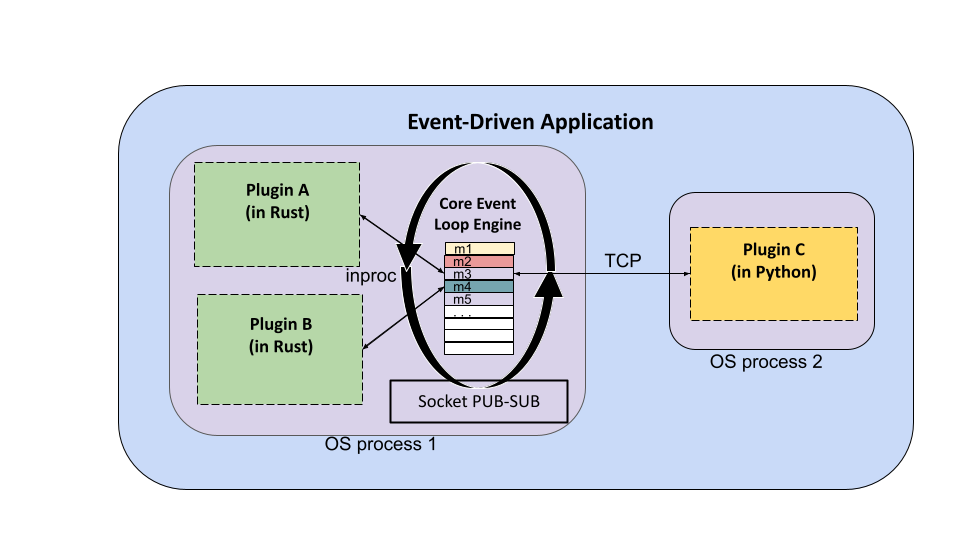A framework for writing event-based applications that utilize a plugin architecture. Applications built with event-engine are written in Rust but can utilize plugins in written in multiple languages. For the initial
release, support for external plugins in Python will be supported, but support can be added for additional
languages if there is demand.
Events correspond to statically typed messages that can be transmitted over a socket and are the basic mechanism of communication between plugins of the application. Each application defines its own event types, including the mechanisms for serializing and deserializing an event's message to/from bytes. No assumption is made about the serialization format used for events, and different event types can utilize different formats.
Plugins are independent components of an application that create and consume events. Each plugin defines
the event types it is interested in, and the core event-engine proxies event messages to the application's
plugins using a publish-subscribe pattern.
Plugins can be "internal" or "external". Internal plugins run as child threads within the main (Rust) application process and are necessarily written in Rust. External plugins run as separate OS processes and can be written in any language.
All event message communication happens via zmq sockets which event-engine manages. Internal plugins
send and receive event messages using inproc
The main steps to building an application using event-engine are as follows:
- Define the
EventTypes andEvents for the application. Theevents.rsmodule includes two traits,EventTypeandEvent, to be implemented. - Define the plugins for the application. These are the indpendent components that will create and consume
events. The
plugins.rsmodule includes thePluginandExternalPlugintraits to be implemented. - Create an
event_engine::Appobject and configure it with the plugins for the application.
use event_engine::App;
// define events and plugins
// create the App object, register the plugins and run
fn main() {
// two Rust plugins
let msg_producer = MsgProducerPlugin::new();
let counter = CounterPlugin::new();
// an external plugin written in python
let pyplugin = PyPlugin::new();
// main application object
let app: App = App::new(5559, 5560);
app.register_plugin(Arc::new(Box::new(msg_producer)))
.register_plugin(Arc::new(Box::new(counter)))
.register_external_plugin(Arc::new(Box::new(pyplugin)))
.run()
.unwrap();
()
}
In the case of external plugins, a small Python module, events.py, included within the pyevents
directory of this repository, has been written to simplify the process of writing Python plugins.
There is also a Docker image, tapis/pyevents, which can be used to build a standalone container
with a Python plugin.
This repository includes a complete example application consisting of two (internal) Rust plugins and
one external Python plugin. The application is packaged as two Docker containers -- the main Rust
application, with the two Rust plugins, runs in the first container and the Python plugin runs in the second
container. See the example directory for more details.
